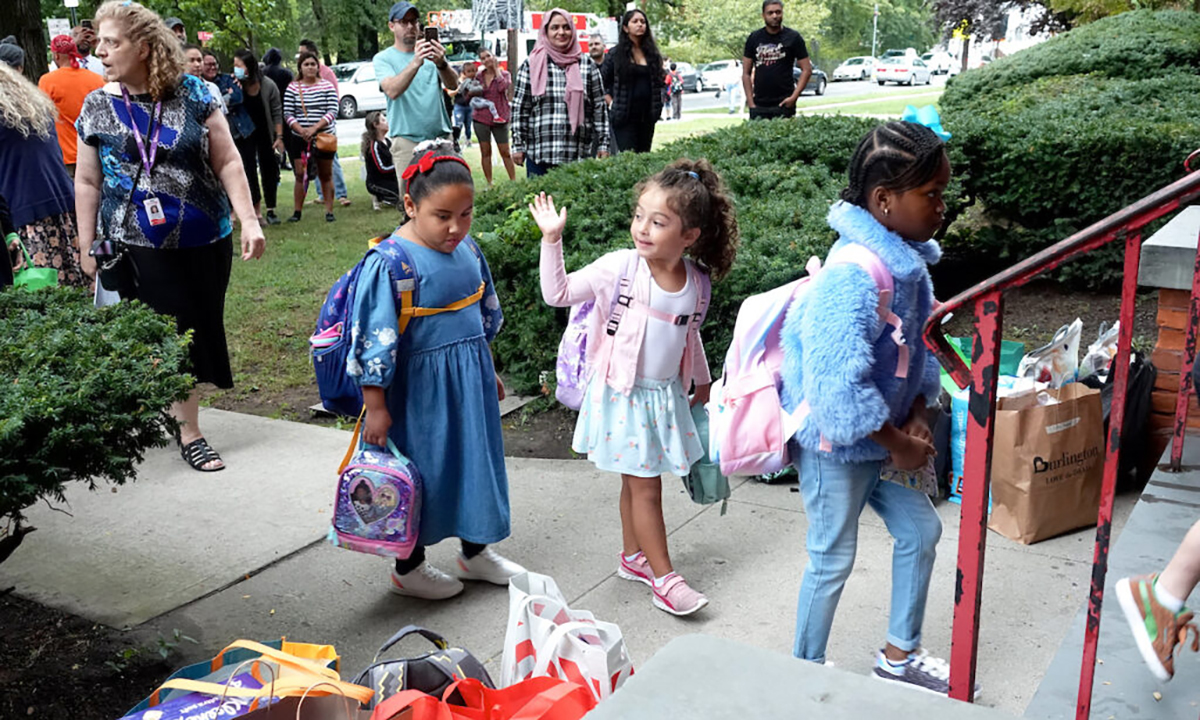New Jersey Test Scores Plunged as Students Struggled With COVID Disruptions
The state's first educational assessments since the pandemic started show reading and math scores fell calamitously

Get stories like this delivered straight to your inbox. Sign up for The 74 Newsletter
Test scores plummeted for New Jersey students in almost every grade, subject area, and demographic on statewide standardized tests given in the last school year, offering the first official look at the COVID-19 pandemic’s crippling impact on children’s academic achievement.
State education officials earlier this month reported the results of several standardized tests administered to the state’s 1.4 million students last spring, the first time these assessments were given since the pandemic’s start. They were suspended during the pandemic’s first two years.
The results show that students in grades 3 to 9 scored lower on nearly every measure of the New Jersey Student Learning Assessments since 2015, when it was first administered. Just 49% of students passed the language arts portion of the test, 35% passed math, and 23% passed science, assessments showed.
Students did no better on an exit exam gauging graduation readiness, officials said.
More than half of New Jersey’s high school juniors tested in March didn’t meet proficiency requirements for graduation, with vulnerable students most unprepared.
Ninety-five percent of English language learners, 93% of students with disabilities, 80% of Black students, 77% of low-income students, and 74% of Hispanic students failed the language arts portion of the state’s exit exam, compared to just 30% of the highest performers, Asian students. Those groups fared only marginally better on the math portion.
The state last spring adopted a new New Jersey Graduation Proficiency Assessment with higher passing scores. But legislators worried about learning loss intervened, and Gov. Phil Murphy signed a law last summer that made the new assessment a “field test,” meaning students must take it but aren’t required to pass it to graduate.
The results of tests for English language learners and students with intellectual disabilities were equally dismal, officials said.
The declines mirrored national trends that also showed widening gaps between schools’ highest- and lowest-performing students.
The scores, reported during a seven-hour state Board of Education meeting, prompted an edgy exchange between one school board member and Angelica Allen-McMillan, the state’s acting education commissioner. Andrew Mulvihill, the board’s vice president, warned McMillan he had a “Monday morning quarterback question” that was “maybe a little political.”
“Do you think it was a good idea that we close schools, in regard to looking at this these results?” Mulvihill said.
Allen-McMillan responded: “I defer to the Department of Health, and Gov. Murphy has done that throughout the pandemic and into the endemic and made decisions based on science. And so I stand by the decisions that were made by Gov. Murphy.”
Schools statewide closed in March 2020 under gubernatorial order, and many remained so into the 2020-21 school year, shifting to online instruction.
Mulvihill asked how charter schools and schools that remained open during the pandemic fared on assessments, but officials said such a breakdown wasn’t yet available. District- and school-level scores weren’t released.
Allen-McMillan told board members officials have plans underway to reverse course, with the Murphy administration earmarking nearly $270 million for education recovery initiatives.
She outlined a three-year state plan called New Jersey Partnership for Student Success that will enlist 5,000 volunteers and community groups to serve as tutors, mentors, and coaches to help struggling students.
Under the plan, the state will spend $10 million to create a statewide “high impact tutoring” program and $5 million on two early literacy programs, Allen-McMillan said. Officials haven’t yet determined how many and which districts will get the funding.
The initiative was inspired by a national plan of the same name and President Biden’s summer callout for 250,000 tutors and mentors to help kids catch up in school.
Sen. Teresa Ruiz, the chamber’s majority leader, said in a statement that the assessment results serve as “a jarring alarm to the work that lies ahead.”
One school board member, anticipating a public furor over the dismal test results, pleaded for understanding.
“Politicians will be quick to grab these numbers, and they’ll be quick to point their fingers at whatever the blame it is that they feel will suit them,” board member Joseph Ricca said. “The reality is what we’re seeing here is the outcomes of the human struggle.”
Behind the poor test results are scores of pandemic-related deaths, lost jobs, and other hardships that kept students from thriving — and that schools had no control over, Ricca said.
“There was a tremendous amount of challenge and trauma that took place all throughout the state of New Jersey and the world. And the performance of children on a standardized assessment is what it is,” Ricca said.
Some reformers didn’t want to hear it.
Paula White, executive director of student advocacy nonprofit JerseyCAN, blasted education officials for a lack of transparency and an “unacceptable time lag” in reporting assessment results.
“The commissioner’s PowerPoint was high on optics and headlines but lacked meaningful data, substance, urgency, and vision,” White said in a statement. “The state only provided summary graphs and incomplete data. To this day, we still need to find out which districts or schools are the beacons of light that we can learn from at this crucial time.”
New Jersey Monitor is part of States Newsroom, a network of news bureaus supported by grants and a coalition of donors as a 501c(3) public charity. New Jersey Monitor maintains editorial independence. Contact Editor Terrence McDonald for questions: info@newjerseymonitor.com. Follow New Jersey Monitor on Facebook and Twitter.
Get stories like these delivered straight to your inbox. Sign up for The 74 Newsletter

;)